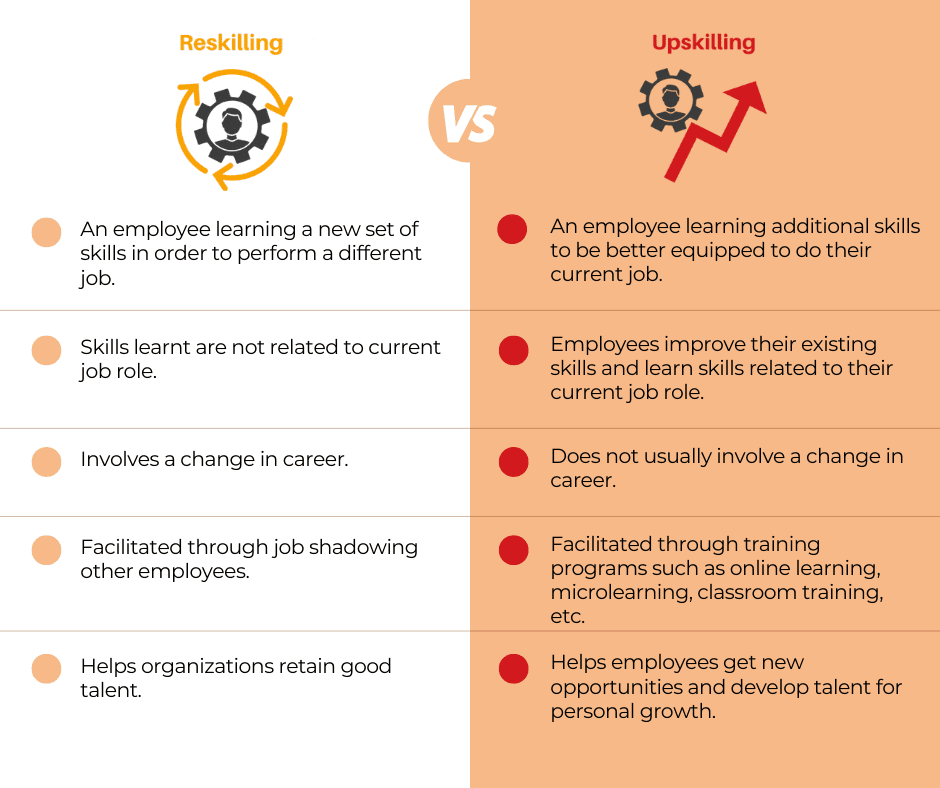Upskilling is the process of learning new skills to enhance our skill set . Upskilling is most common within the workplace. Employers may want to train their workforce to acquire new skills, ultimately enabling workers to grow in their current positions and bring added value to the business.
Yet, many individuals who are not involved with an organization may also want to upgrade their skill set. They might take night classes, short courses, master’s programs, or other professional training to achieve this. Ultimately, this is a means of enhancing your career path.
Reskilling is the process of learning new skills with the goal of finding a different job or career path. This is attractive to individuals who are looking to change their jobs or careers. They may take further education to learn the skills needed to enter an entirely new field of activity to what they were previously in.
Yet, this also happens in the workplace. For instance, an employer may wish to retrain a worker if their position has become redundant, or if their skill sets would be better suited to another role.
3 Reasons why upskilling or reskilling is important now
Most people upskill or reskill to stand out from the crowd. Yet, after the past year, it’s now more important than ever. Here’s why:
1. The impact of COVID
As a result of the pandemic, unemployment rates have skyrocketed, with the opposite true for job security. This has had detrimental effects on people’s livelihoods and led to a sizeable reduction in the global economy.
However, as history shows us, a global pandemic or major natural disaster is usually followed by a period of prosperity. Research has found that even though COVID still exists, the world is on the verge of a post-pandemic boom.
With all this growth and optimism, gaining new skills will put us in a better position to take advantage of a stronger economy. So, if we want to make sure we’ve got the edge, it’s time to start thinking about upgrading our current skills or changing our career path altogether now.
2. Growing digital technologies and innovation
While digitalization was underway prior to COVID, the pandemic has accelerated the rise of the digital economy. This has led to some major developments in the world of work. These include:
3. Digital transformation
While companies were previously reluctant to switch their traditional systems to digital, the pandemic almost left them with no choice. If they wanted to continue doing business while the world was in lockdown, they needed to work digitally.
This has led to a sharp rise in the development of new apps, systems, and software. As a result, employers have had to retrain their workforce to use this technology. Yet, where technology is replacing workplace jobs, such as traditional administrative roles, workers are having to reskill to find other roles.
4. New job roles
Digitalization is creating new job positions that didn’t exist 10 years ago. These are typically associated with using and developing technology such as app developers, cloud computing specialists, social media managers, and user experience managers.
And the current demand for these jobs is on the rise. As a result, more people are now looking to gain these skills and find work within the burgeoning tech sector.
5. Automation
One of the downsides of the growth in technology is that it is replacing a large number of low-skilled, manual jobs. Although automation has been happening for many years, this is likely to increase much more rapidly in the coming years.
The BBC reports that “Up to 20 million manufacturing jobs around the world could be replaced by robots by 2030.”
As their jobs become redundant, these workers are having to reskill or upskill in order to find new work.
6. Skills shortages
Digitalization also creates a demand for new skills – and this is proving to be problematic. There is now a global shortage of skills connected to new technology-based jobs.
The top 10 skills in demand in 2023 include:
- Complex problem-solving
- Critical thinking
- Creativity
- People management
- Coordinating with others
- Emotional intelligence
- Judgment and decision-making
- Service orientation
- Negotiation
- Cognitive flexibility
Presently, the importance of upskilling the workforce has increased as compared to the earlier days. Therefore, new skills are highly imperative and are in demand as it is being introduced every year in almost every organization. Workforce upskilling helps companies to make sure that their employees are equipped with the proper skills and adapt to the changing environment. This is where workforce upskilling takes place.
The most important benefit of Upskilling your workforce helps them improve and stay productive to deliver a better outcome by fulfilling their organizational goals. Many studies have shown that training your existing employees helps save more money as compared to hiring new ones. Therefore, processing upskill programs would be more profitable than shifting to a new hiring cycle.
Ways to Upskilling Our Workforce
There are various ways to upskill our workforce. It all relies on the requirements of our employees and our organizational goals, and the techniques and strategies they use to gain a more profitable outcome. Employee upskilling programs help organizations in retain employees at a lower cost. Below given are some of the points that can help us make upskilling approachable and effortless:
1. Set the Objective
The first and foremost step is to define the ease of action by identifying the requirement. Calculate the productivity present level of skills our employees have and find out the missing ones. The skill gaps in the workplace can create blocks for future company growth. So, before setting any goal for our company, test and know the essential analysis. They are necessary for future strategies and development.
2. Provide Training Time
If we want to make our team work more effectively, we should upskill our workforce in the workplace to create learning and growth as part of our company culture with their productive hours. It’s been difficult for employees to stay back late after working hours, so provide training time to our employees for some hours during the whole working day or allocate a whole workday for upskilling requirements daily.
3. Development Programs
A team manager needs to understand the requirement for skill learning for the future personal growth of their team members. Therefore, a personal development plan is essential for all working employees. It can be better if they approach every single employee on their own because the support or confidence helps them give their best in every way. The upskill plan will be perfect to motivate our employee’s anytime.
4. Learning Area
The on-sight offices may contain distractions everywhere, and finding a comfortable place for learning may be difficult. Similarly, the same is applied to remote or work-from-home teams or employees because finding a quiet or peaceful place to learn may be a challenge. Having a relaxing and silent space may lead to more dedication and self-development. Therefore, it helps to create more concentration on the provided tasks.
5. Financial Support
Setting up a training program in our company can help and encourage our employees to improve and work better. But, it does not deliver complete knowledge and new skills. So, approaching them with seminars or some third-party conferences can help them more in their training sessions. Therefore, if our employees are showing interest in the learning programs or these sessions, uplift them by providing financial support.
6. Post-Training Plan
If we are thinking about establishing this new upskilling culture in our organization, it can only help our employees learn new things. Whereas having just the knowledge never helps if it does not turn into practice. Hence, there must be a post-training plan for how our employees should apply these skills to real-life situations.
7. Create a Learning Culture
Creating a learning culture can help our employees in every way. So, after completing the upskilling program, let our employees understand the procedures and then help them to take their skills into practice. Learning always helps to improve and enhance work patterns and performances when we create an environment that promotes development and growth.
8. Boost Microlearning
Tiny steps toward big goals lead to more profit. If we overburden our employees, it may cause distraction or stress. Whereas the small steps help employees learn fast and with more focus.
Benefits of Upskilling your Workforce
There are many benefits of upskilling & reskilling our employees in terms of building better employee engagement. Take a look at the best advantages of upskilling the workforce:
1. Build well-organized Teams
Upskilling our employees helps in filling skill gaps. If an employee doesn’t have proficiency in their work or is unable to complete any task, another co-worker who indulged in the training sessions and has knowledge about the same can make up for that skills deficiency.
2. Boost Productivity
Employees who take the benefits of the upskilling training work with more passion and productivity, which leads to more acceptable workflow, employee engagement, teamwork, communication, and more inferior expenses.
3. Acquire Advanced Proficiency
Employees need to stay updated with modifications and learn new skills to achieve their goals. Workforce upskilling can help our business with new talents and proficiency in working patterns, which helps to deliver a huge competitive benefit.
4. Encourage Top Talent
Employees do not give their best in their jobs when they do not witness any career growth possibilities. To Upskill employees, organizations need to provide training and constant learning opportunities. Employees can enhance their skillfulness, offer actual dedication, and show more effort to stay with the company for the long term. That allows us to keep the top talent for better outcomes and away from competitors.
5. Train for Evolution
Sometimes businesses have to lose their top talents or acquire new employees for better outcomes. For those situations, upskilling our workforce can benefit our business by delivering employees an assorted collection of new skills.
Challenges of Upskilling Employees
Employee upskilling is very useful & beneficial. But some of its challenges when starting employees upskilling are-
- Highly Expensive- Upgrading the skills of our employees can be highly expensive. Not only do we have to pay for the training itself, but we also have to account for lost productivity while employees are away from their normal duties.
- Need Extra Time- For training & upskilling take a significant amount of time. Employees need time to learn new skills and put them into practice. This can disrupt our business’ normal operations and lead to lost revenue.
- Quality of training-If we’re paying for training, we want to be sure that our employees are getting the best possible education. Otherwise, we’re just wasting our money.
- Upskilling can create a sense of unease among employees who feel like they are being left behind. If some employees are receiving training to develop new skills while others are not, it can lead to feelings of resentment and jealousy.
- Employees who are not being upskilled may feel like their jobs are at risk of being automated or replaced by someone with more advanced skills.
Upskilling our workforce can be a great way to improve our business. Despite these challenges, upskilling is essential for businesses to stay competitive and for employees to remain marketable. With the right planning and execution, upskilling can be a positive experience for both businesses and employees.
Learning new skills can have enormous positive impacts on different aspects of your career as well as your personal life. Anytime we allow ourselves to be challenged, our horizons expand. There is a Chinese proverb that celebrates learning, “learn till the day you die”, which basically means that we should never stop improving ourselves and making room for advancements because, by staying stagnant, we’re halting progress and allowing ourselves to fall behind. Aside from the philosophical values of learning, the following are six reasons why we should upskill ourselves starting today.
1. Discover new interests
After staying in the same job for many years, we may begin to get bored by the responsibilities that accompany our job title. We might lose the initial passion that we had for our niche, and our work starts to feel tedious and drab. Learning new skills will help us get in touch with new subjects and areas that might stir our interest.
Since industries are forever evolving, there may be new tricks to the trade that we haven’t come across in our field, which can help us reignite our spark. We might even surprise ourselves by discovering a new passion that can make our life exciting again.
2. Secure our job
Upskilling is an integral part of meeting the evolving demands put forth by our job, even if we have been doing the same kind of work for years. Learning new skills will make us more efficient and adept at fulfilling our responsibilities by increasing our knowledge and expertise on subjects and tools associated with our job role. We are more likely to improve our job security if we outperform ourselves every year. This is made possible by upskilling.
3. Prepare for the future
The accelerating development of technology has resulted in recurrent changes in the needs and demands of different industries, which in turn has created new and evolving job roles that require us to be up to date with the skill set that they entail. If we do not keep up with the changing times, we are at a higher risk of losing our job – the current work culture values capability over seniority and if we do not meet our job requirements, we may be laid off. Upskilling will also help us become ready for the new jobs that will be introduced in the future.
4. Fill the skill gap
With the creation of new tools and technology, there has been an increase in the development of new job designations and roles. For instance, the digitization of businesses has resulted in the demands for new job positions like app developers, cloud computing experts, website developers, digital marketers, social media managers, and visual media specialists.
These new job roles require new skill sets like expertise in online tools such as Google Analytics, Word Press, and Adobe Illustrator that aid in digital marketing and website development, for instance. This has created a skill gap in organizations because they need to use these tools but do not have employees who have adequate skills. By upskilling ourselves, we can diversify our job roles and adopt new responsibilities that will not only help in filling this gap but also aid us in redefining our approach to our work.
5. Become more aware and disciplined
Learning new skills not only helps in the growth of our career but also our personal development. By regularly attending courses and workshops that will help us increase our knowledge repository, we will become more aware of the trends in the market and the developments in the niche of our work. We will also develop discipline during the course of mastering a new skill, which may well have a positive impact on other aspects of our life.
6. Climb up the job ladder
Upskilling ourselves will bring us more job opportunities that will help us climb up the job ladder. With the right skills, we can apply for higher-level jobs that will give us better pay, work environment, and responsibilities. If we want to change the niche of our jobs, we can opt for reskilling – we can learn skills related to a completely new job discipline, master the basic skills required for that niche and upskill ourselves from there. Both upskilling and reskilling can bring us life-changing job opportunities that will help us achieve our dreams sooner than we expect.
Role of upskilling in the Gemstones, Jewelry and Precious Metals industry
Upskilling has played a vital role in upscaling the aspiring jewelry enthusiasts, artisans, diamond graders & jewelers of the world. Skilling in all the areas and functions of the industry such as diamond processing, colored gemstone processing, jewelry manufacturing, wholesale, retail, and exports has ensured a prompt contribution to the Gems & Jewellery Industry. Precious Metals Industry is going through massive AI disruption.
Many countries are adopting to the environmental consciousness and willing to improve the labor force. They started cross training the Mining workers, Engineers to fit to the changing work culture.
New age startups are using Software in Service and SaaS Model to help the companies in Gemstones, Jewelry and Precious Metals. Employers have started rethinking the productivity of the workers. Both the Private and Governments in these countries are cross training and upskilling the work force with Certification programs for the workforce.
Final Thoughts
Upskilling is vital for adapting to the dynamic job market, enhancing employability, and fostering personal growth. It opens new opportunities, ensuring individuals remain competitive and relevant. By embracing continuous learning, people can secure their career progression and contribute to economic growth, making upskilling a crucial investment for future success.






